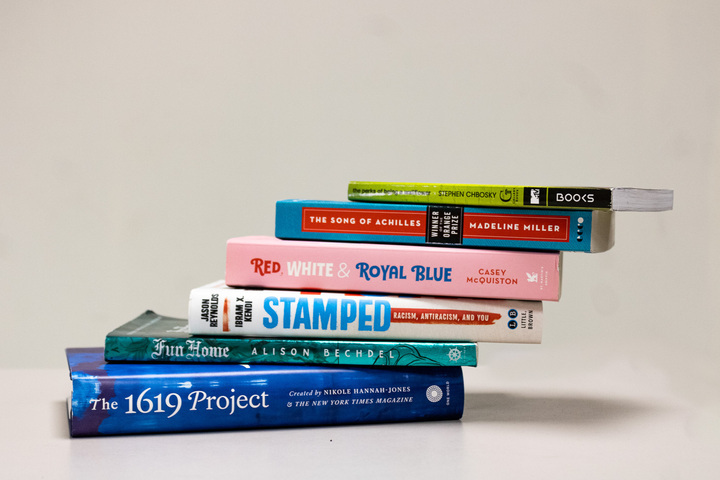Lecture: Our curriculum needs queer literature
A stack of banned and LGBTQ+ themed books sit atop each other. Books such as these were discussed in a lecture about LGBTQ+ inclusion in curriculum. (Sean Reed | Northern Star)
April 12, 2023
The intersections of sexuality, schooling and young adult literature is a high debate in the United States right now. On Thursday, Corrine Wickens, professor of literacy education, delivered an enriching presentation on her research in that topic.
The event started with attendees picking up small mirrors and looking at themselves. It was a reminder that we are all beautiful and that we all matter. Wickens expressed how books can act as mirrors too, as well as sliding doors and windows, and how we should use them to look inside ourselves and bring about action.
“Books are mirrors. They serve as reflections of worlds, our worlds,” Wickens said.
The presentation began with Wickens breaking down language such as gender identity, sexuality and sexual orientation. As an educator, she explained how other teachers and educators can be more inclusive in the classroom by knowing their student’s pronouns and gender identities.
While mapping out the construction of childhood, and her research, Wickens discussed the influences of modern constructions: Jean Piaget’s cognitive development studies and Jean Jacques Rousseau’s definition of children as innocent beings. However, the act of parents’ protection might endanger some children.
“We are always trying to go against this notion of what does it mean to protect and keep them (children) innocent,” Wickens said.
Three big events surrounding LGBTQ+ human rights unfolded within Wickens’ area of research: Lawrence v. Texas in 2003, the overturning of “don’t ask, don’t tell” in 2011 and the 2015 case of Obergefell v. Hodges. The banning of books with LGBTQ+ themes play a part in this as the banning of such books was often a result of these occurrences.
A big chunk of the presentation was Wickens discussing the challenges to LGBTQ+ inclusive curriculum. What she’s found is that teachers are worried about teaching anything with LGBTQ+ themes as it may be viewed as sex education, even though the two aren’t connected.
“There’s no question ever about ‘Romeo and Juliet.’ That’s been part of the ninth-grade curriculum forever. There’s heterosexuality, they kill each other because they’re so ‘in love’ and lust with each other. Is that really developmentally appropriate for ninth graders?” Wickens said. “But if I teach about two girls holding hands, then I’m teaching sex education.”
Integrating LGBTQ+ books into the classroom can happen thematically, indirectly or directly. These approaches can have LGBTQ+ themes as the central focus or are depicted in the background of a novel.
Wickens shared the staggering number of banned and challenged books from 2017 to 2021 and how last year the American Library Association received a record number of demands to censor library books.
“We found that race books were more likely to be challenged but LGBTQ was more likely to be banned,” Wickens said.
On a table, Wickens had over a dozen middle-grade and young-adult books on display and allowed attendees to pick up the books and read what they were about. Her presentation encouraged attendees to read banned books and to read more inclusive and diverse literature.







